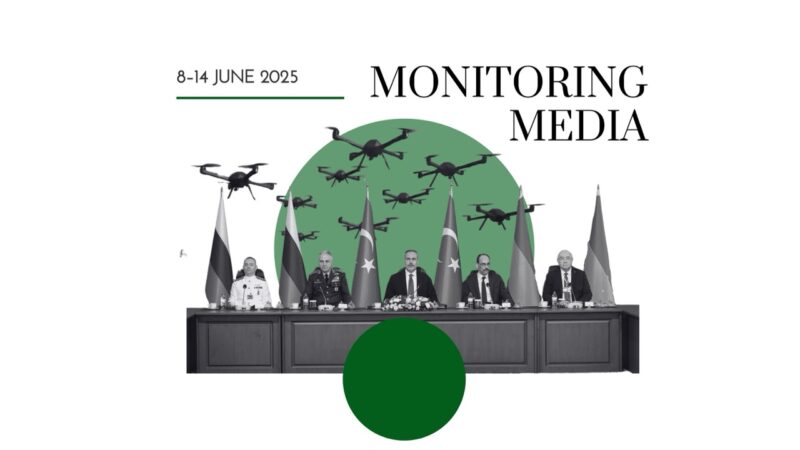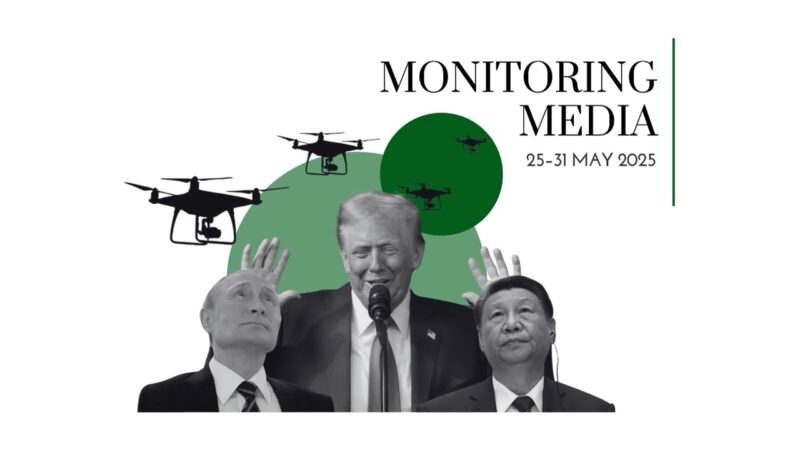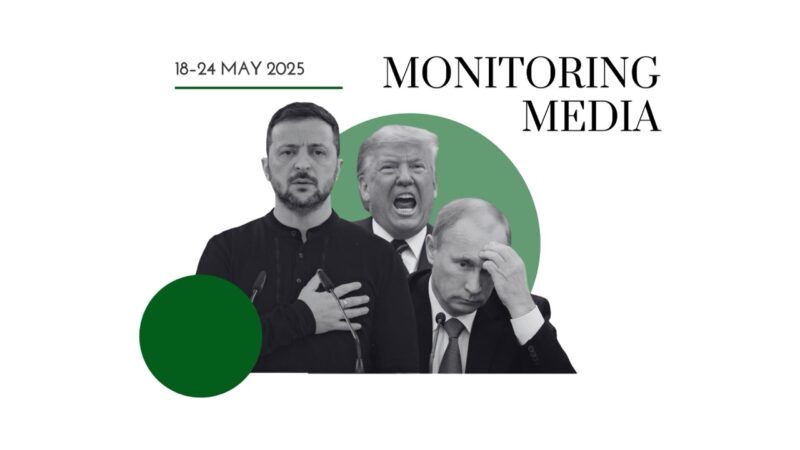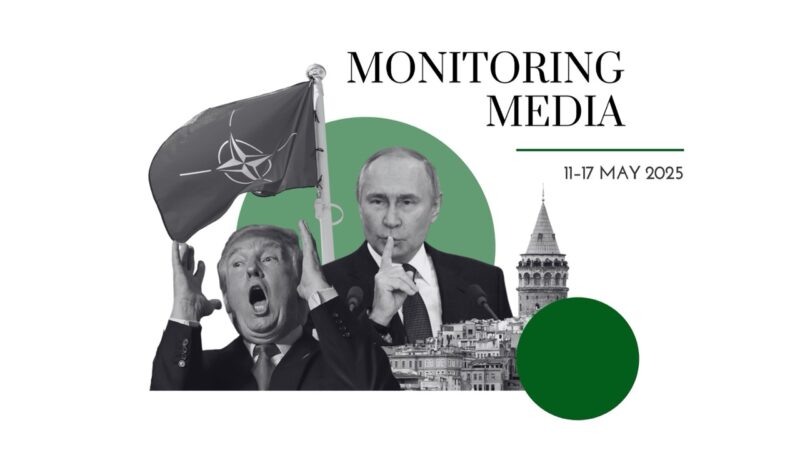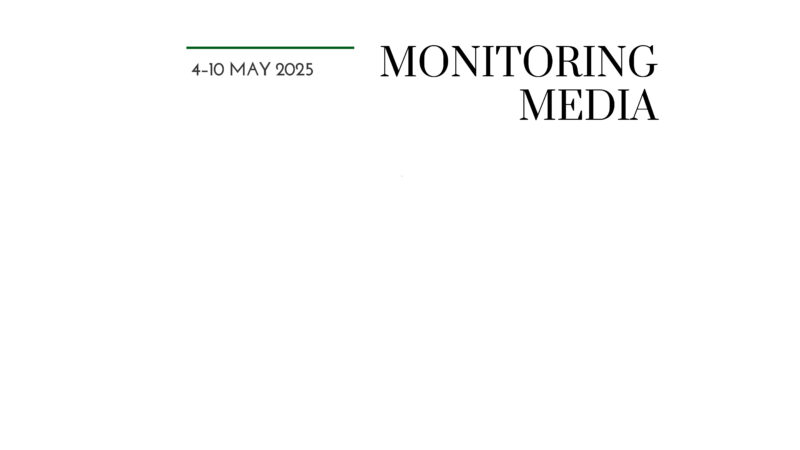Ukraine and Israel linked by war and aid

CIUS weekly report on North American media coverage of Ukrainian affairs, 8–14 October 2023
Five publications (Foreign Policy, Politico, The Washington Post, CBC, The Globe and Mail) were selected to prepare this report on how the situation in Ukraine has been portrayed in the North American press during the past week. The sample was compiled based on their impact on public opinion as well as on their professional reputation, popularity among the readership, and topical relevance. These publications represent centrist viewpoints on the political spectrum.
This report covers only the most-read and relevant articles about Ukraine, as ranked by the respective North American publications themselves in the past week. Its scope covers promoted articles on home pages and articles from special sections on Ukraine, with the hashtag #Ukraine, from the paper editions of the publications, and about Ukraine from opinion columns and editorials.
Topics featured in the selected articles:
- The world and Ukraine: Reconsidering the arguments in favour of staying the course on Ukraine; connections between the wars in Ukraine and Israel; why negotiating with Russia is still not the best option; Ukrainian-Polish relations.
Main arguments:
The debate on Ukraine needs to be rethought. Michael McKinley (Politico) writes that Hamas’ attack on Israel should not overshadow Russia’s war against Ukraine. The conflict in the Middle East, Azerbaijan’s assault on Nagorno-Karabakh, and Serbia’s border build-up with Kosovo are the result of the destruction of the international order caused by Russia’s full-scale invasion of Ukraine. The world has become more unstable and violent. Western countries seeking to stabilize the order should remember that Ukraine remains “the first line of defense.” US leaders should rethink the case for staying the course on Ukraine: “Messaging on Ukraine should include greater realism about the conflict, its complexities, its likely outcome, and what it means for global security.” There are three key factors to consider when reframing the Ukraine debate: (1) Russia is stronger militarily and politically, constituting a long-term threat to global (not just European) stability, with the war set to continue for some time, and “military assistance to Ukraine [would help to not only] defeat Russia now but also transform Ukraine’s military capabilities so it can serve as a bulwark against further Russian aggression in Europe and Central Asia”; (2) Western governments should make it clear to their citizens that “the war in Ukraine is a wake-up call for major and accelerated reinvestment in their own military capabilities”; (3) It is crucial to present Ukrainians as they are, “a complex nation responding to an almost impossible situation.” Creating unrealistic expectations and idealizing the Ukrainian resistance has a high probability of backfiring. The consequences of Ukraine’s defeat in the war are potentially global: “The war could easily draw Americans and Europeans into combat. These are the consequences and rationales for supporting Ukraine that need to be underscored, repeatedly.”
Ukraine and Israel are linked by war and aid. Josh Rogin (Washington Post) writes that the White House is working with leaders of both parties in the Senate to link US aid to Israel with aid to Ukraine. The idea is to pass a joint funding bill in the Senate and give Ukraine-skeptical House Republicans a choice: either approve both bills or reject them. However, “the divisions and dysfunctions inside the GOP risk undermining the United States’ ability to support both efforts.” Isolationists in the conservative movement who want to cut off funding to Ukraine advocate redirecting resources to Israel and voting to provide aid to Israel and Ukraine separately. The situation is compounded by the chaos among Republicans in the House of Representatives after Kevin McCarthy was ousted as speaker. Therefore, this decision of the Biden administration is extremely risky. In addition to the internal factor, there is also an external factor that affects this process: “Russian propaganda outlets are eager to present US aid to Israel and Ukraine as contradictory, with President Biden forced to choose between them.” Russia, Iran, and Hamas are working together to wage a war against democracies and destroy the existing world order. That is why, according to the author, “The US game plan for both Ukraine and Israel is essentially the same. It should support the partner countries that are the victims of aggression, give them the weapons they need to fight, and build a diplomatic coalition around them.”
Negotiating with Russia is still a road to nowhere. Raphael S. Cohen (Foreign Policy) emphasizes that calls for negotiations with Russia are still unfounded. The rationale for negotiating has evolved depending on the battlefield situation: statements ranging from “Ukraine can’t possibly win” to “the war is becoming too expensive.” Currently, the rhetoric of supporters of negotiations is that “Washington should negotiate an end to the war—or, more precisely, pressure Ukraine to capitulate.” However, the author believes that arguments favouring negotiations with Russia are weak. Despite the political struggle and divisions among lawmakers, whether Congress will support negotiations with Russia or not is unclear. The military justification for negotiating is also unconvincing. Despite the lack of spectacular results of the Armed Forces of Ukraine this year, “the counteroffensive—in the assessment of former US Chairman of the Joint Chiefs of Staff Mark Milley, as well as outside analyses—is making progress, albeit slowly.” Moreover, according to Cohen there are signs that Russia is suffering defeats on the domestic front: the collapse of the ruble, fuel shortages, mysterious deaths of members of the Russian elite, etc. Finally, there is a moral argument in favour of negotiating. However, Washington should remember that it is Ukrainians, not Americans, who are fighting and dying in this war, and ultimately they are the ones to decide. According to the author, “the notion that the West must somehow save Ukrainians from themselves by pushing for negotiations is as misguided as it is arrogant and self-righteous.” There are also no signs that Russia’s appetites would be sated with control over Ukraine, which is also an argument against negotiations. Instead, “defeating Russia in Ukraine is the best guarantee that Russia will never be able to realize its [unlawful] ambitions.”
The war in Gaza affects both Ukraine and Russia. Adam Taylor (Washington Post) argues that Saturday’s attack on Israel by the Palestinian Hamas movement—and the war in the Gaza Strip in response—will affect the course of the Russo-Ukrainian war. For Ukraine, there is a severe risk that the West’s interest in the war in the centre of Europe will diminish, leading to a decline in support. For Russia, this armed conflict threatens to irrevocably cool off relations with Israel, “a former economic partner and a potential high-tech military supplier for Ukraine.” According to Taylor, in public statements “he has directly compared Russian President Vladimir Putin to Hamas”—this despite Israel’s reluctance to impose sanctions on Russia and its refusal to provide Ukraine with weapons. Instead, Russia’s President Putin has remained silent; then, during a meeting with Iraqi Prime Minister Mohammed Shia al-Sudani he called the situation a failure of Washington, apparently contradicting his previous “close relationship with Netanyahu.” According to Western intelligence, the war in Ukraine has brought Russia closer to Iran, “Israel’s most powerful regional rival and a key backer of Hamas.” There are hopes that linking US aid to Ukraine with aid to Israel would overcome the persistent Republican opposition to the latter and eliminate the false dichotomy of providing arms to Ukraine or Israel.
Ukraine shows the West the meaning of unity and moral clarity amid global challenges. Andrew Coyne (Globe and Mail) highlights how President Zelensky’s rapid and unequivocal response stood out as he expressed condolences and solidarity with Israel while his own country defends itself against Russia’s invasion. Coyne argues that Zelensky’s motivation for aligning with Israel could have stemmed from Kyiv’s attempts to win the support of MAGA Republicans in the US. However, there is a more significant rationale: alignment of the moral and strategic interests of democracies in the face of an alliance formed by authoritarian regimes and terror organizations—including Russia, Iran, and Hamas, with support from China and North Korea. Coyne reminds readers that Europe’s security would be jeopardized if Ukraine fell, while the credibility of the US and its allies would be undermined if Israel faced defeat. The author declares that the world has not faced such a threat since the end of the Cold War. Lastly, he also criticizes Canada’s military capabilities: “The state of our military is accordingly a national disgrace and an international embarrassment. We have too few troops, the few we have are horrendously underequipped, and the equipment we buy is massively, massively overpriced. We cannot begin to defend our own territory, and we refuse to contribute our share to the collective defence of the West. And then we are dismayed to find ourselves shut out of international forums.”
Experts deem Polish-Ukrainian relations strong despite anti-Ukraine rhetoric. Paul Waldie (Globe and Mail) reports that increasing anti-Ukrainian sentiment in Poland has impacted the country’s policies and election campaigns, with surveys showing a drop in support for Ukrainian refugees. This shift has become a central issue in the country’s election campaign, with the far-right Confederation party vowing to cut financial benefits to Ukrainian refugees and reduce military and humanitarian aid to Ukraine. The ruling Law and Justice Party (PiS), which has been a strong supporter of Ukraine in the past, has also toned down its support: it has promised to end social benefits for refugees in March, emphasizing stability and national security in its campaign. Tensions between Poland and Ukraine have been exacerbated by a dispute over grain shipments. Although campaign rhetoric has heated up, the solid foundation of relations between Poland and Ukraine is likely to remain, according to Daniel Szeligowski, a senior research fellow on Ukraine at the Polish Institute of International Affairs: “The only change could be that Poland would no longer support Ukraine so proactively.”
